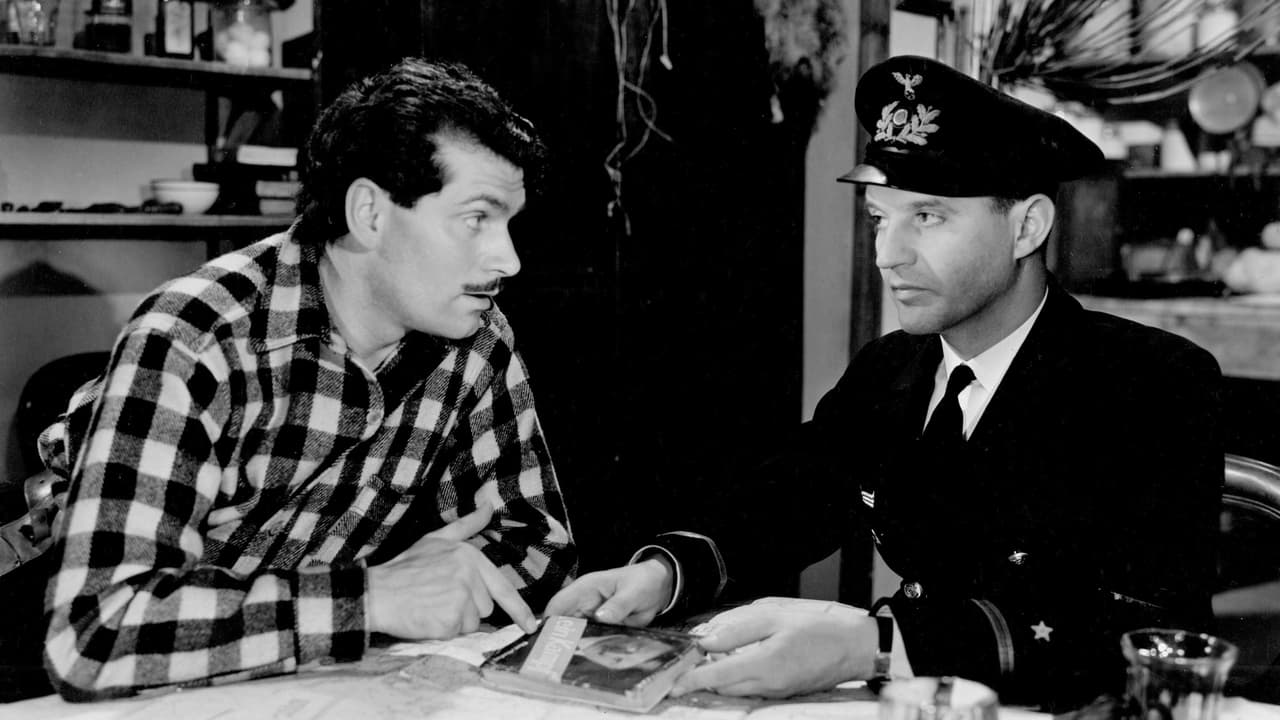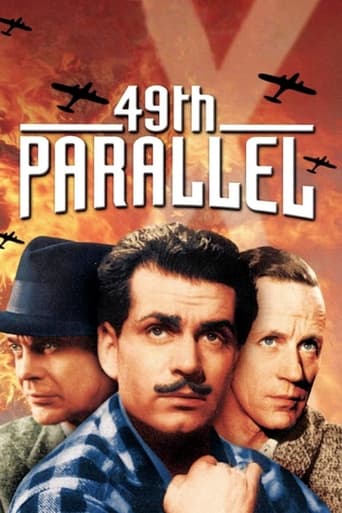

What a waste of my time!!!
... View Moredisgusting, overrated, pointless
... View MoreAfter playing with our expectations, this turns out to be a very different sort of film.
... View MoreThe film may be flawed, but its message is not.
... View MoreI watched this movie a few nights ago and was well into it before realizing I'd seen it once many years ago. I recall the unique viewpoint of the story from the Germans' side but never knew the significance of the propaganda slant until I looked it up on here and read the reviews. No need for me to comment further on that aspect or on the virtues of the film itself; the various reviewers are more knowledgeable than I and have successfully deconstructed it far better than I could, but I thought it a remarkable coincidence that I should stop at an estate sale the VERY NEXT DAY and find a VHS tape of it with a plaid-clad Olivier flanked by Howard and Massey on the cover. I'd have bought it but I no longer have a suitable player.Incidentally, the movie played on a local broadcast station, one of those late-night-peppered-with-commercials things that makes it exasperating to watch and difficult to follow, but checking the schedule I found that it repeats on Sunday at noon so I will try again and pay more attention from the start in order to better appreciate the work.One thing I thought everyone overlooked was an exchange by the characters at the Hutterite community when Anna was describing the loss of her mother at sea. One of the Germans asked what ship she'd been on, leading me to think it would be revealed that U-37 had sunk that ship, but the thread was not followed and the moment was lost. I do agree about the numerous plot holes and inconsistencies.One final note: The plane on which Hirth flies back east alone looks like a Lockheed Electra, the craft in which Amelia Earhart vanished.
... View MoreA WWII U-boat crew is stranded in northern Canada. To avoid internment, they must make their way to the border and get into the still-neutral United States.Said Michael Powell, "I hoped it might scare the pants off the Americans." Screenwriter Emeric Pressburger remarked, "Goebbels considered himself an expert on propaganda, but I thought I'd show him a thing or two." After persuading the British and Canadian governments, Powell started location filming in 1940.Now, how effective the film was in getting America into the war, I don't know. Certainly not nearly as effective as Pearl Harbor ended up being. But what you do have is a great war story of Nazis in Canada. The plot has some questionable elements -- the Germans speak very good English -- but the idea of a war thriller is always good if you have the talent to pull it off like Powell does.
... View MoreSo sayeth one of the characters, Richard Armstrong Scott (played by Leslie Howard) and never have truer words been said of films in general and of this one in particular. WW2 has long gone but this celluloid gem remains and although filmed for WW2 propaganda this has not limited its continued enjoyment and appreciation. It is a superb commentary on the dangers of any ideology that demands total blind servitude of its followers and perpetrates cruelty and murder to attain it. The film is a stinging commentary on Nazism set against a back drop of the ordinary and human endeavours of people in Canada.The story opens with a German U-Boat off Canadian waters. The boat and crew require fuel and supplies to enable their return to Germany and so they select a remote part of Canada (Hudson Bay) to surface whilst 6 of the crew go on foot to a village to procure the necessities for the journey home. Disaster strikes when the U-Boat is traced and bombed to pieces by Canadian fighter pilots leaving the 6 men who reached shore stranded on foot and in enemy territory. Their journey to reach the USA, which was still neutral in WW2 at this point, is the main focus of the film and is told in 4 chapters: the pillaging at Hudson Bay; a sojourn at a German Christian community, the Hutterites; on foot going west where they encounter a writer researching the native Amerindians; and finally, a confrontation with a Canadian soldier on board a freight train travelling across Niagara Falls from Canada into the USA. During the course of the journey the 6 crew dwindle as they die or are arrested leaving just one of them trying to reach the US at Niagara.There are many stars of the era in this film and performances all round are superb even Laurence Olivier's turn as a French Canadian (resembling Gael Garcia Bernal when he sports a beard!) that sometimes raises eyebrows. There is some witty and perceptive dialogue and even though the Nazis sometimes get the better of the Canadians, the Canadians are given the greater voice. Some fine examples of this are:"You and your Hitlerism are like the microbes of some filthy disease.""I never would have believed that grown up men could behave like spiteful little schoolboys" (after a Nazi symbolically destroys a Matisse and Picasso)."One armed superman {the Nazi} against one unarmed decadent democrat." The chapter in which the Nazis hide out with the Hutterites is particularly poignant as one of the Nazis discovers to his astonishment that in the community people work because they want to support the community, not for financial gain. They work at whatever they enjoy and/or are skilled at. If they leave their community for any reason and return they are not punished but welcomed back. The contrast drawn between them and Nazi Germany is implicit. The importance of the Hutterite chapter is that this film is not anti-German but anti-Nazi.Watching the film 70 years since it was made one feels patriotism roused as well as hatred and fear of Nazism and what it represents; amazing as a piece of propaganda and marvellous as a film. Finally, this film served Canada and its peoples very well giving it and them a character separate from and distinct to the USA.
... View MoreEarlier Powell and Pressburger (pre-Archers?...?) skit about a bunch of crashed Germans in Canada during WWII, right before the US enters the war. The Germans want to make it to the US border where they'll have political asylum, but first they must get through the vast landscape and 11 million population of not-quite-so-wary Canadians--adversaries that are more happy to listen to their German philosophy with a cock-headed grin and a justifiable democratic argument against their politics than they are trying to stop or kill the group in particular. Yet somehow the group of six Germans quickly falls to five, then four, then three, then two...As a bit of WWII propaganda it has its fallacies. As a survival in enemy territory narrative, it's interesting because you want to see how far they'll go (everyone loves the underdog), but you also want them to get stopped. The Archers mix those contrary conceits very well. And as a character-based war drama, it's a bit too caricaturistic to take too seriously. Everyone has extreme accents, and the lead German has the faint trace of a lisp. Powell and Pressburger do the best when contrasting their hyper-diagonal marching against the curved countryside, and they take a particularly "democratic" stance here--one so democratic, at points it lingers near communism, which the Germans are appropriately appalled at but not all that believably considering their close proximity to this little country called the USSR (perhaps you've heard of it).It's fun seeing these two auteurs get a handle on the type of characters they like and the type of filming they want to do, but later they were to go on to create much more sophisticated, gorgeous, and well-told works that stand out greater in the annals of cinematic history. They would keep such things as the caricatures (the Yank in A Canterbury Tale, the entire figure of Colonel Blimp), international drama (Black Narcissus, A Matter of Life and Death), and love of the countryside (A Canterbury Tale, A Matter of Life or Death) in much more solid and spectacular narratives. This movie is an early work, and feels it, but it's not quite so bad as their somewhat regrettable I Know Where I'm Going.--PolarisDiB
... View More